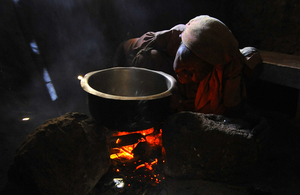UK hosts international conference on clean cooking
International conference examines impact of cooking with solid fuels on traditional cookstoves and open fires.

Picture: Alex Kamweru/Global Alliance for Clean Cookstoves
An international conference examining the health and environmental impacts of cooking with solid fuels on traditional cookstoves and open fires is being held in London today by the Department for International Development (DFID), the World Health Organization (WHO) and the Global Alliance for Clean Cookstoves (Alliance).
The World Health Organization estimates that every year 4.3 million people die from illnesses caused by exposure to smoke from cooking over coal, wood, dung, or biomass stoves. This is more than the number of people dying from HIV/AIDS, malaria and tuberculosis, combined. Nearly 3 billion people in the developing world cook food and heat their homes with solid fuel on traditional cookstoves and open fires.
Clean cookstoves and fuels have the opportunity to address harmful emissions of smoke, and reduce burns. They can also mitigate emissions of greenhouse gases and short-lived climate pollutants, help stem deforestation, and reduce the time women and girls spend collecting fuel, often in dangerous situations far from their homes.
WHO will soon be issuing new indoor air quality guidelines for household fuel combustion to provide technical recommendations about fuels, cookstoves and household energy technologies with the best performance for protecting health.
Lynne Featherstone, International Development Minister said:
It is tragic that so many people’s lives are put at risk simply from cooking and heating their homes. The international community needs to do more to find practical and scalable clean cooking solutions, allowing people to lead healthier lives. Today’s event will push for increased international action, including more research and will help expand the development, supply and use of sustainable clean cookstoves and fuels.
Radha Muthiah, Executive Director of the Global Alliance for Clean Cookstoves said:
The Global Alliance for Clean Cookstoves welcomes the opportunity to raise global awareness regarding the little known issue of household air pollution and to highlight the many cost-effective benefits of clean cookstoves and fuels. We applaud DFID for its leadership in helping to raise awareness of this “silent killer” and to mobilize much needed donor resources around clean cooking solutions. We look forward to working closely with the United Kingdom to scale market-based solutions that address the devastating health, gender, and environmental toll that the use of solid fuels for cooking takes on families in the developing world.
Dr Poonam Khetrapal Singh, Regional Director for WHO’s South-East Asia Regional Office, which represents some 11 countries where rudimentary, smoky cookstoves are still widely used, including India, Bangladesh and Nepal, said:
Women and children pay a heavy price from household air pollution since they spend more time at home breathing in smoke and soot from cookstoves. Cleaning up household air pollution will significantly prevent non-communicable diseases among these vulnerable groups.
Over 100 people including academic experts, civil society, NGOs, development and private sector practitioners and donors working in the clean cookstove, low carbon, energy and health sectors attended the conference which examined what combinations of cooking practices, improved stoves and fuels can be used in the future to achieve better health and social outcomes for people in developing countries, and how these can be best scaled-up.
Notes to editors:
-
The Department for International Development (DFID) recently won the “Best Initiative by a Government Body” at the 2014 Climate Week Awards, for efforts to support the Global Alliance for Clean Cookstoves to reach its goal of enabling 100 million households to adopt clean and efficient cooking solutions by 2020.
-
In November 2013, DFID announced increased financial support to the Global Alliance for Clean Cookstoves for research into improved evidence of the business models and social dynamics that could take the clean cookstove market to scale